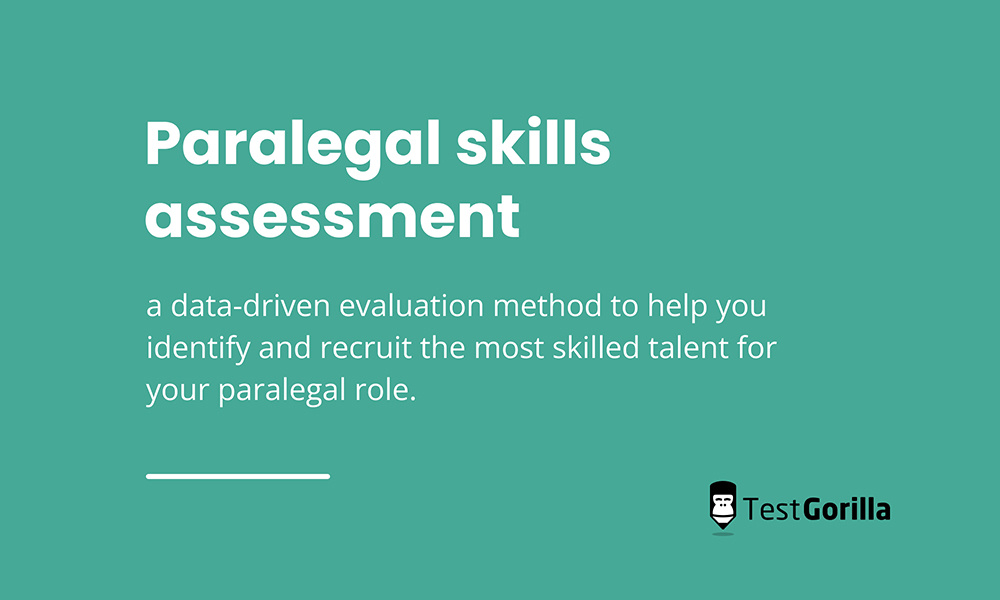Paralegals provide legal support services, such as preparing legal documents, interviewing witnesses, and handling administration for complex cases. They may specialize in various areas of the law, like family or criminal law.
Paralegal roles require specialist law knowledge to perform accurate legal research, attend legal procedures, and properly handle sensitive data. Hiring a candidate already equipped with the relevant skills and characteristics ensures your clients will receive the proper legal support when navigating challenging cases, but what’s the best way to determine if your candidates have the right abilities?
This article explores several relevant skills you should seek in candidates during your paralegal recruitment process. We also share some recommended skills tests you can include in a paralegal skills assessment to evaluate your candidates’ strengths, including our Legal Assistant (US) skills test.
What’s a paralegal skills assessment?
A paralegal skills assessment is a data-driven evaluation method to help you identify and recruit the most skilled talent for your paralegal role. Weeding through resumes and discovering the best candidates from your applicant pool can be difficult. Factors like unconscious bias can lead to mis-hires, more significant hiring expenses, and wasted time, especially if you need to restart the hiring process at any point.
A paralegal assessment includes several tests that ask questions targeting specific skills relevant to the job. Comparing candidates’ results will help you identify individuals whose skill set aligns with your requirements, narrowing your applicant pool quickly and efficiently.
The tests and overall assessment will give you greater confidence in the candidates you’re inviting to an interview, where you can learn more about their personality and knowledge.
Candidates’ results will show whether they have the skills to perform tasks relevant to the role, which may include the need to:
Liaise efficiently between clients and attorneys
Schedule appointments and organize meetings
Maintain legal and financial records
Bill clients and manage expenses
Make preparations for hearings
Show professionalism in a law firm setting
You can access many alternative testing tools when creating your assessment, such as role-specific tests and custom questions related to your vacancy.
For instance, if you’re looking for a paralegal to focus on legal research, you may need a candidate who can handle legal documents and use legal database expertise to support a legal case. The Legal Research and Writing (US) skills test is ideal for this.
A paralegal assessment can also feature traits tests to measure personal characteristics, such as conscientiousness and communication. These qualities contribute to your paralegal’s ability to support attorneys and work diligently on research to help clients, legal researchers, and legal assistants.
Why are paralegal skills important?
Welcoming a capable paralegal to your team has many advantages for your organization, regardless of whether you’re working on a significant or low-key case. Hiring a skilled candidate could yield the following benefits:
1. Improve the quality of legal research
Recruiting paralegals skilled in completing high-quality legal research, such as gathering legal sources like constitutions and regulations, ensures your business builds strong cases for all clients. Candidates with strong legal research skills can research past court cases, identify and understand legislation, annotations, and treaties, and summarize legal information.
After finding and onboarding a candidate with these skills, it’s simpler for your organization to make informed decisions, identify legal issues, stay up-to-date on legal developments, and support cases.
For instance, suppose your legal firm needs to support a client in a contract dispute where a party cannot meet their obligations. A paralegal can gather information on past court cases containing evidence and facts to prepare the perfect defense.
2. Help with document preparation
Paralegals with organization, record-keeping, and data management skills can reduce the time it takes to prepare legal documents. Efficient document preparation ensures paralegals prepare files before the deadline, mitigating the risk of missing records and inaccuracies throughout the case.
Although an attorney will have the legal expertise to prepare a strong case, document preparation can take a long time. Some cases may require extensive document organization, taking time out of an attorney’s day.
With a skilled paralegal, you’ll have extra support and can assign all legal document preparation to your new hire, ensuring the attorney can focus on the technical aspects of the case.
3. Strengthen rapport between clients and the firm
Paralegals are a point of contact between your firm and its clients. They share updates about the case and answer clients’ questions. Finding a capable paralegal ensures your client has the correct information to take the right actions during the case, such as professionally representing people or businesses.
Each time a paralegal offers support, it ensures your firm enhances its client relationship. For example, suppose your firm needs to support a client through a divorce case. A skilled paralegal can explain the steps involved in the case and provide emotional support to help the client handle the challenging situation.
Using case management methods to schedule meetings and maintain communication with clients, paralegals provide reliable legal support that quickly builds trust between the client and your firm. Positive feedback from satisfied clients can elevate your firm’s reputation, helping you appeal to a broader client base.
The best insights on HR and recruitment, delivered to your inbox.
Biweekly updates. No spam. Unsubscribe any time.
Which skills does a paralegal need?
Paralegals need industry-specific skills to perform technical tasks, handle contracts, and write reports. Hiring candidates with relevant traits is equally important because it may influence how they communicate with others and manage tasks.
The level of skills and job responsibilities paralegals have also influence their pay.
Consider the following traits and hard skills when assessing candidates:
1. Database management skills
Paralegals need database management skills to complete research and access up-to-date legal information. Maintaining legal databases involves searching for specific data, locating facts, and analyzing the information a case requires.
Sub-skills for this include organization, attention to detail, and risk assessment.
For example, risk assessment skills suggest your candidate knows how to back data up, prevent loss, and share sensitive information. Organizational ability shows they can create, store, and share documents in accessible locations, enabling teams to work cohesively. While this skill also helps them maintain neat and updated calendars, attention to detail ensures specific information, like dates, is correct.
Proficient skills mean they can confidently operate industry-relevant database software like LexisNexis or Westlaw.
For example, a firm settling a dispute with a client claiming tenants damaged their property would need a paralegal with good database management skills to collect and store contracts, evidence, and statements in an accessible location. Maintaining an organized database means paralegals can easily retrieve the relevant records, helping the team develop a strong case.
2. Communication skills
The work of a paralegal requires discussions with court personnel, stakeholders, other paralegals, and clients. They must interact with these individuals and share a range of case-related facts in time for the court case.
Paralegals working for a firm must communicate with different clients and adjust their communication styles to match each client.
For example, in a child custody case, a paralegal may use a supportive tone to help clients manage their emotions. In a bankruptcy case, a paralegal might choose instead to use a matter-of-fact tone of voice when providing updates to the client.
Adequate preparation for a court hearing can ensure your paralegal conveys information promptly to keep all parties well-informed. This means your firm can build a strong relationship with its clients and ensure the case progresses smoothly.
Active listening also supports smooth communication because paralegals can identify key conversation information. This skill enables them to ask relevant questions to understand better the tasks or cases they’re discussing.
Clients may appreciate paralegals who listen actively while communicating because they feel heard and valued.
Recommended reading: How to improve workplace communication
3. Time management skills
Time-management skills are essential for paralegals because meeting deadlines can affect the court hearing process and impact the case’s outcome.
If a paralegal can’t manage their time efficiently, they may struggle to handle multiple assignments or prioritize tasks. They may rush through their work, leading to errors and delays in case progression.
On the other hand, a paralegal with strong timekeeping skills can:
Stay organized
Provide efficient and timely support to attorneys
Meet deadlines and present information to clients on time
They will know how to use timekeeping software, calendar notifications, project management software, and reminders to keep tabs on upcoming court hearing deadlines. These actions can help paralegals allocate the right amount of time to case research, case management, and client updates and avoid missing deadlines.
Paralegal skills and traits tests
With TestGorilla’s traits and skills tests, you can build an assessment to find candidates proficient in legal database use and research. You’ll also identify people who can manage their time well and communicate clearly. Keep reading for our curated list of relevant tests to consider including in your paralegal skills assessment.
1. Legal Research and Writing (US) test
Our Legal Research and Writing (US) test shows whether paralegals can complete legal research for US law firms and clients. It’s a valuable way to review your candidate’s knowledge of legal documents and the fundamentals of legal writing.
Select the Legal Research and Writing (US) test to determine if candidates also understand how to complete legal analysis and use legal databases as part of their research. If analyzing legal problems and understanding legislative changes is vital for your firm's work, use this test to find candidates with these skills.
2. Communication skills test
Our free Communication skills test reveals if candidates can communicate clearly with written and verbal language. It tests your candidates’ active listening skills and will help you determine if your candidates can interpret your client’s and stakeholders’ case-related information.
Can your candidates identify unclear information or notice gaps in a case? Use the Communication skills test to learn if your paralegals can clarify information, identify critical issues, and gather essential data related to the case.
3. Time management test
The Time management skills test determines if your candidates can prioritize their tasks, plan toward timely task completion, and execute the plan effectively. It also evaluates your candidates’ reflection and communication abilities, ensuring they can review their task performance to enhance their workflow.
Is your candidate good at resolving problems within a time limit? Choose the Time management skills test to determine if they can avoid distractions in real-world scenarios and make decisions in time for court hearing deadlines.
Paralegal skills assessment FAQs
In this section, we cover some key paralegal skills assessment FAQs. Read on if you’re unclear about how a paralegal skills assessment works or would like more information about the testing process.
What makes up a paralegal assessment?
The content of your paralegal skills assessment can include 20 custom questions and five skills tests. With TestGorilla, you decide which skills tests to have in the assessment. For instance, you might include a Legal Assistant (US) skills test to assess your candidates’ filings, client management, and preparation skills.
How difficult is a paralegal assessment?
The difficulty of your paralegal assessment will depend on the specific skills tests you choose for your candidates. For example, the Legal Assistant (US) skills test is an intermediate-level, ideal for mid-level paralegals. The Negotiation skills test is also an intermediate-level test. However, other tests may be suitable for senior paralegals and are more challenging.
How are the results of a paralegal assessment shown?
The results of your assessment will appear as a percentage. The higher the percentage, the more proficient your paralegal candidate is. You will also receive a star ranking for each candidate, which you can use to compare multiple skilled paralegals.
How TestGorilla can help you find skilled paralegals
TestGorilla will help you save time in your recruitment process. Our assessments are the best way to forget about unreliable and time-consuming resume screening and complete a thorough candidate review in a cinch. This approach means you’ll be able to provide a better onboarding experience to candidates by dedicating more time to this hiring stage.
Experts craft every test in the extensive TestGorilla library. Our tests offer a hiring method that works even if you are not a legal expert. This means you’ll never struggle to assess your candidates’ skills – you can compare your candidates’ abilities just by looking at their results.
Finally, using TestGorilla means avoiding mis-hires and saving money by hiring the right paralegal immediately. Our tests are objective and data-driven, making candidate selection easy.
Hire a paralegal for your firm with TestGorilla
TestGorilla’s skills tests are a bias-free and data-first option, leading you to the best paralegal for your open role. Whether your firm is large or small, our tests provide an objective method to evaluate and compare candidates.
Our library includes cognitive ability, situational judgment, and personality tests to help you thoroughly evaluate your paralegal candidates.
Check out our skills test library, register for free, and request a demo to get started with TestGorilla.
You've scrolled this far
Why not try TestGorilla for free, and see what happens when you put skills first.















